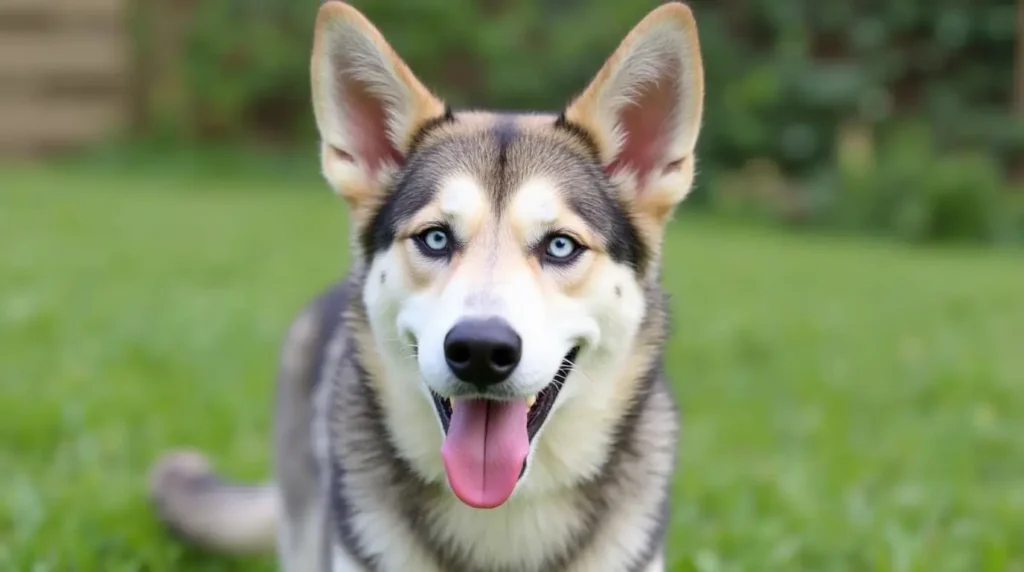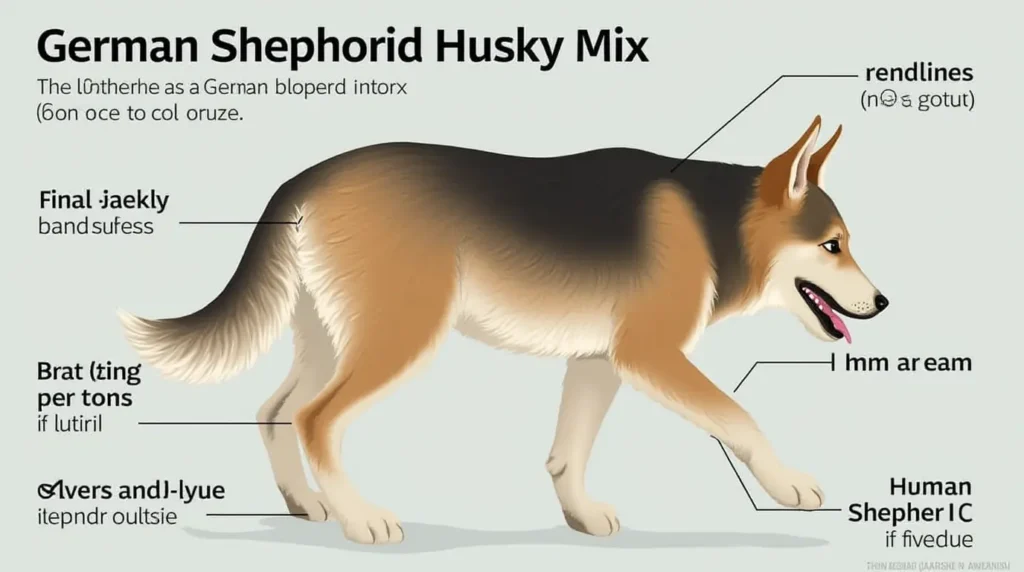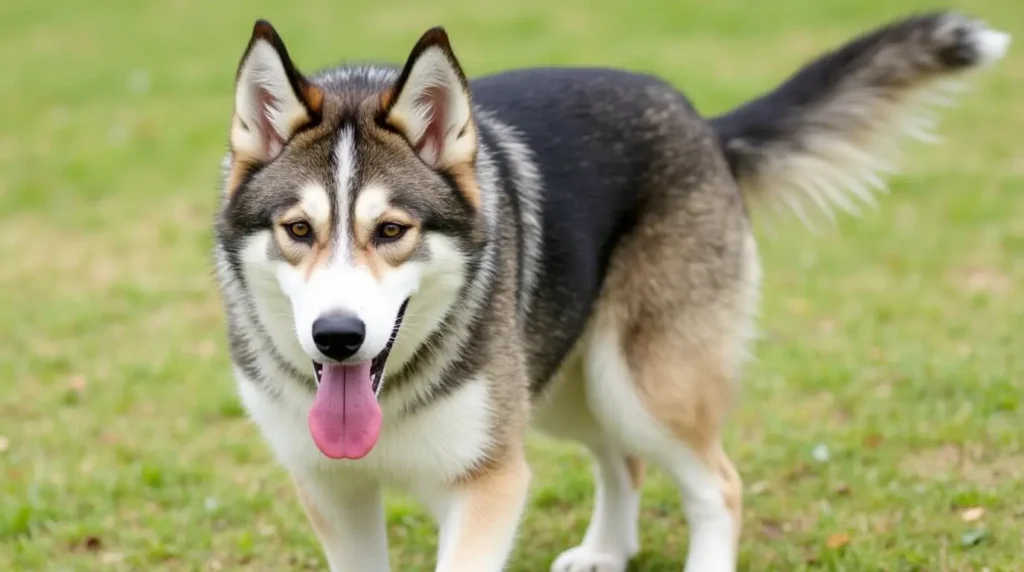German Shepherd Husky Mix: Owner’s Complete Guide
Introduction: Why the German Shepherd Husky Mix is Gaining Popularity
Have you ever wondered what happens when you mix two of the most beloved and energetic dog breeds—the German Shepherd and the Siberian Husky? The German Shepherd Husky mix, also known as the Shepsky, is a hybrid breed that has gained popularity in recent years due to its striking appearance and incredible intelligence. But what exactly makes this mix so appealing, and is it the right dog for you?
In this comprehensive guide, we’ll delve into everything you need to know about the German Shepherd Husky mix. From their physical characteristics to their temperament and care needs, we’ll provide you with all the details you need to decide if this amazing hybrid dog is a perfect fit for your family.
What is a German Shepherd Husky Mix?

Understanding the Hybrid Breed
A German Shepherd Husky mix is a cross between two well-known breeds—the German Shepherd and the Siberian Husky. Both parent breeds are known for their intelligence, energy, and loyalty, which makes the Shepsky an ideal companion for active families. However, like all mixed breeds, the German Shepherd Husky mix can inherit traits from either parent, making each individual dog unique.
Related: Husky and German Shepherd Mix: A Perfect Family Pet
History of the German Shepherd and Husky Mix
The German Shepherd was originally bred in Germany in the late 19th century to herd and protect livestock, while the Siberian Husky was developed by the Chukchi people in Siberia as a sled dog. Their mix is relatively new, as hybrid dogs began becoming popular in the early 2000s. The mix takes the best traits from both parents, combining the hardworking, protective nature of the German Shepherd with the energetic, free-spirited traits of the Husky.
Physical Characteristics of a German Shepherd Husky Mix

Size, Weight, and Build
The German Shepherd Husky mix is typically a medium to large-sized dog. Adult Shepskies generally weigh between 45 to 88 pounds and stand about 21 to 25 inches tall. These dogs are strong and muscular, with a well-balanced build that reflects both parent breeds’ athleticism.
Coat Color and Appearance
One of the most noticeable features of the German Shepherd Husky mix is its thick, double-layered coat. The coat is often a combination of the German Shepherd’s tan and black with the Husky’s striking whites, silvers, or blues. Shepskies are often characterized by pointed ears and a well-proportioned snout—traits they inherit from both parent breeds.
Eyes and Facial Features
A German Shepherd Husky mix may inherit the Husky’s bright blue eyes, which are known for their piercing and intense look. However, it’s also possible for them to have brown or amber eyes like their German Shepherd parent. Some Shepskies have one eye of each color, a feature that adds to their unique and captivating appearance.
Personality and Temperament of the German Shepherd Husky Mix
High Energy and Intelligence
Both the German Shepherd and Siberian Husky are extremely intelligent and energetic dogs, and the Shepsky is no different. This mix requires regular exercise to burn off energy, making them perfect companions for active owners. Whether it’s hiking, running, or playing fetch, the Shepsky thrives in an environment where it can stay physically and mentally stimulated.
Loyalty and Socialization
Shepskies are incredibly loyal to their families. The German Shepherd is known for its protective nature, while the Husky is often more independent. As a result, the German Shepherd Husky mix tends to form strong bonds with its family, although it may also display some independent tendencies. Early socialization is key to ensuring your Shepsky gets along well with strangers and other pets.
Independence vs. Bonding
While German Shepherds tend to be highly obedient and eager to please, Huskies are more independent and stubborn. The Shepsky may inherit these contrasting traits, meaning it can be trainable, but may require more patience and consistency from its owner.
Related: Australian Shepherd Mix Husky: A Unique Companion
Is the German Shepherd Husky Mix Right for Your Family?
Ideal Family Environments for This Mix
The German Shepherd Husky mix thrives in active families with a lot of space, such as homes with large backyards or rural areas. They are well-suited for families that enjoy outdoor activities and are willing to provide daily exercise and mental stimulation.
Compatibility with Children and Other Pets
Shepskies are typically good with children, especially if raised with them from a young age. They are also usually friendly with other pets, but their strong prey drive (inherited from the Husky parent) can sometimes make them less trustworthy around smaller animals. Proper training and socialization can help mitigate this.
Training the German Shepherd Husky Mix

The Importance of Early Training
Due to the intelligence of both parent breeds, the German Shepherd Husky mix is generally easy to train. However, they can also be stubborn and independent, which may make training a bit of a challenge at times. Early socialization and obedience training are essential to help them become well-behaved adults.
Common Training Challenges and Solutions
One of the most common challenges with training a Shepsky is its independent nature. While they are highly intelligent, they may not always be eager to follow commands. Positive reinforcement, consistency, and patience are key to overcoming these training hurdles.
Health Concerns in German Shepherd Husky Mixes
Common Health Issues
Like all hybrid breeds, the German Shepherd Husky mix can inherit health issues from both parent breeds. Common concerns include hip dysplasia, elbow dysplasia, and progressive retinal atrophy. Regular vet check-ups and a healthy lifestyle can help prevent or manage these conditions.
How to Maintain Their Health
To keep your Shepsky healthy, provide a balanced diet, regular exercise, and routine vet visits. Keeping their weight in check is essential, as both the German Shepherd and Husky can be prone to obesity.
Related: The German Shepherd Lab Mix: Your Ultimate Guide to This Extraordinary Hybrid
Exercise and Mental Stimulation Needs of a German Shepherd Husky Mix
Daily Exercise Requirements
The Shepsky is an active dog and requires at least 60 to 90 minutes of exercise each day. Without sufficient physical activity, this breed can become bored and potentially destructive.
Fun Activities to Keep Them Engaged
Some great activities for a Shepsky include fetch, agility training, and hiking. They enjoy tasks that challenge their mind and body, so providing variety in their exercise routine will keep them happy and healthy.
Grooming a German Shepherd Husky Mix
Coat Maintenance and Shedding
The double-layered coat of the German Shepherd Husky mix means they shed heavily. Regular brushing, at least 2-3 times a week, can help manage shedding and keep their coat healthy.
Bathing and Nail Care
Bathe your Shepsky every 2-3 months, or as needed, and keep their nails trimmed to maintain their overall grooming.
Diet and Nutrition for a German Shepherd Husky Mix
Recommended Diet for a Healthy Mix
Feed your German Shepherd Husky mix a high-quality dog food that meets their nutritional needs. Look for foods that are rich in protein and healthy fats to support their active lifestyle.
Avoiding Overfeeding and Portion Control
Shepskies can easily gain weight if overfed. Be sure to follow your vet’s recommendations for portion sizes and avoid giving them too many treats.
The Cost of Owning a German Shepherd Husky Mix
Initial Costs of Adoption or Purchase
The cost of adopting or purchasing a German Shepherd Husky mix typically ranges from $300 to $1,500, depending on whether you adopt from a shelter or buy from a breeder.
Ongoing Care and Maintenance Expenses
Ongoing expenses include vet visits, food, grooming, and other care costs. Expect to spend $500 to $1,000 per year on average for maintenance.
Common Myths About the German Shepherd Husky Mix
Debunking Common Misconceptions
There are several myths about the German Shepherd Husky mix, such as their supposed aggressiveness or difficulty with training. In reality, they are loving and intelligent dogs, but they do require consistent training and proper care.
What You Should Really Expect
Expect a loyal, energetic, and independent dog that will thrive in an active household with the right amount of attention, exercise, and training.
Related: German Shepherd Pitbull Mix: The Ultimate Guide to This Unique Hybrid Breed
Where to Find a German Shepherd Husky Mix
Adopting Shelters or Rescues
If you’re interested in adopting a German Shepherd Husky mix, check local shelters and rescue organizations. Many Shepskies are looking for loving homes.
Buying from a Breeder: What to Consider
When buying from a breeder, be sure to choose one who health tests their dogs and follows ethical breeding practices to ensure the health and well-being of the puppies.
Pros and Cons of Owning a German Shepherd Husky Mix
Advantages of This Unique Mix
- Intelligent, loyal, and active
- Great family pets when properly trained
- Beautiful appearance with unique eye colors
Challenges to Be Aware Of
- High energy and exercise needs
- Potential for stubbornness and independence
- Grooming and shedding requirements
Conclusion: Is the German Shepherd Husky Mix the Right Dog for You?
The German Shepherd Husky mix is a fantastic dog for the right owner—someone who is active, patient, and ready to commit to training and exercise. With the right care, this dog can be a loyal and loving companion, but it does require time, attention, and energy. If you’re up for the challenge, the Shepsky could be the perfect addition to your family.
FAQs
1. What is the lifespan of a German Shepherd Husky Mix?
The average lifespan of a German Shepherd Husky mix is around 10 to 14 years.
2. How much exercise does a German Shepherd Husky Mix need?
They need at least 60 to 90 minutes of exercise per day.
3. Are German Shepherd Husky mixes good with kids?
Yes, they are generally good with kids if raised in a family environment and socialized early.
4. How do I train a German Shepherd Husky Mix?
Focus on early socialization, positive reinforcement, and consistency in training.
5. How often do German Shepherd Husky mix shed?
Due to their double coat, they shed heavily, especially during seasonal changes.
6. Are German Shepherd Husky mixes prone to health issues?
Like all hybrid breeds, they may inherit health issues like hip dysplasia and eye problems, so regular vet check-ups are important.
7. Can a German Shepherd Husky Mix live in an apartment?
While they can adapt, they are better suited to homes with ample space and a yard due to their energy levels.







